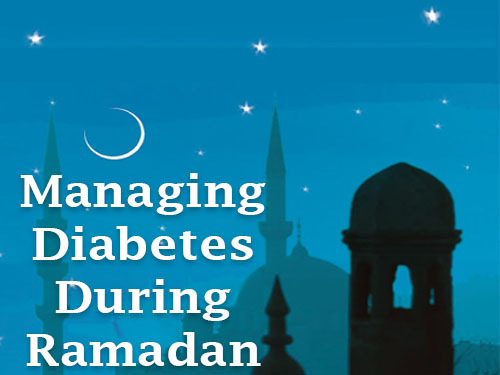
Diabetes Care in Ramadan
Posted on June 17, 2016 with 0 comments
It is the holy month of Ramadan. Fasting during this holy month holds a great religious & spiritual significance. However, for people living with diabetes, it is important to know how fasting will impact their diabetes and take necessary precautions to avoid any complications. We are trying to clarify some of the doubts regarding Diabetes Care in the month of Ramadan.
Who should avoid fasting?
The Holy Quran states that there are groups of people who should not fast if that poses a risk to their health. According to the teachings of scholars of Islamic Religion and The Holy Quran, children, pregnant or breastfeeding women, elderly people should not fast during the holy month of Ramadan. People with poorly controlled diabetes, people who take insulin (Type 1 diabetics) or people with Type 2 diabetes on a mixed insulin regimen and also the people who often have very high or very low blood glucose levels should avoid fasting during Ramadan.
Can I fast if I am a diabetic?
The answer to that question should be decided based on discussion with your doctor. Depending on the type of medications that you are taking for managing your diabetes, your doctor will have to guide you. The doctor may change your medication plan based on your daily schedule of fasting. There are many people who are diabetic and still they fast and face no problems. Every person is unique and diabetes management is based on this fundamental that ‘One Size DOES NOT Fit ALL’.
What kind of risks a person with diabetes faces when he/she is fasting?
Three major risks one should be aware of:
Hypoglycemia (Low Blood Sugar) – Blood glucose levels below normal can result in dizziness, fainting etc. One should restrict the physical activities when fasting. Avoid driving. It is advisable to schedule physical activities after sunset.
If the person experiences hypoglycemia, 15g of carbohydrates (in the form of 2-3 teaspoons of sugar or 180-200 ml (one glass) of regular soda or 120-130ml (one cup) of fruit juice) are given to that person and blood glucose levels are checked once again after a gap of 15 minutes. A small portion of snacks can be given if dinner is not for more than one hour.
Hyperglycemia (High Blood Sugar) – Once the fast is broken, there’s more risk of overeating. That may trigger a sudden surge in blood glucose levels. Low blood glucose can happen during the day while fasting, however, high blood glucose can happen after the fast is broken. Usually, it is considered that fasting reduces the weight, however, in this holy month, every evening meal is more of a celebration and family reunion, resulting in overeating. People often complain about weight gain during this month. It is recommended that you eat small portions.
Dehydration – During the hot and long summer days, one must drink a lot of water, sugar-free and caffeine-free drinks throughout the evening and before dawn.
To avoid these risks, one should plan a proper diet, especially for the fasting month. Our nutrition experts recommend making sure your early morning meal (Sehri) contain a balance of whole grain sources of starchy carbohydrates as well as protein and fat. Fat will slow the digestion process and also gives a feeling of fullness that can last as long as possible into the day.
Eating of dates and drinking water usually marks the breaking of fast during the evening (Iftar). One must limit the dates to 1-2 each evening. Plenty of water, sugar-free juices, and caffeine-free drinks should be ideal throughout the evening. Caffeinated drinks & beverages are to be avoided to prevent dehydration. Iftar meal is more like a celebration. Our experts recommend not overeating. Small portions are ideal. Whole grains, proteins (lean sources of meat, fish, chicken) but strictly limited fats and sugary delicacies should be the choice during Iftar.
If I check blood sugar levels, will it break my fast?
It is a sheer myth that checking the blood glucose levels will break your fast. One must monitor blood glucose levels to keep a check on hypoglycemia (low blood glucose). If the blood sugar level drops below 70 mg/dl, it is advised not to continue fasting.
Should I stop taking my diabetes medicines, as I will be fasting during Ramadan?
One must NEVER stop taking diabetes medicines. But you will take them at different timings. Your doctor may also change the dose of certain medicines. Diabetes management is more of a team effort. Ahead of Ramadan, speak to your team of diabetes caregivers including doctors, dietitians, physiotherapists, and diabetes educators etc. to find out the right dose and schedule of your diabetes medications during Ramadan.
To get a personalized advice regarding how to manage your diabetes in Ramadan, get in touch with experts at Advanced Diabetes Centre.
Advanced Diabetes Centre organizes special free group counseling sessions every Tuesdays between 2-4 pm. You can register by calling us on 2600100.
Advanced Diabetes Centre offers a complete Organised Diabetes Care under one roof. Advanced Diabetes Centre has an entire team of specialized diabetes consultants, including expert clinicians from other specialties such as Dermatology, Cardiology, Neurology, Nephrology, Surgery etc. Qualified and trained nutrition experts, physiotherapists, diabetes educators guide the patients throughout and empower them to take control of their diabetes.
For more information give a missed call to 7227000100 and for appointments call 0261-2600100.
Advanced Diabetes Centre is committed to improving Organized Diabetes Care.
Tags: Blood Glucose Level, Blood Sugar level, Dehydration, Diabetes, Diabetes Centre, Doctor, Fasting, High Blood Sugar, Low blood sugar, medication, Ramadan, Type 2 diabetes